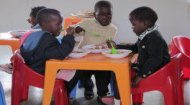|
The scope of volunteer work in Eswatini is broad, catering to various skill sets and interests. Reputable organisations, both local and international, facilitate placements across critical sectors, ensuring that volunteer efforts are directed where they are most impactful and sustainable. Healthcare and HIV/AIDS Support: Eswatini has one of the highest HIV prevalence rates in the world, making healthcare a critically important sector for volunteers. Projects often involve assisting local clinics and hospitals with basic patient care, health education, HIV/AIDS awareness campaigns, counselling services, and support for Orphans and Vulnerable Children (OVCs) affected by the epidemic. Volunteers might help with administrative tasks, community outreach, or even directly assist nurses and doctors if they have relevant medical training. Education and Early Childhood Development: Improving educational outcomes is vital for Eswatini's future. Volunteers are highly sought after to assist in schools, from pre-schools and primary institutions to secondary schools. Roles can include teaching English, mathematics, science, or other subjects, assisting local teachers, developing educational resources, or even contributing to extracurricular activities like sports or arts programs. Support for early childhood development centres is also crucial, providing foundational learning and care for young children. Community Development and Social Support: These projects are often multi-faceted, addressing various community needs. Volunteers might work with community centres, orphanages (OVC homes), or local NGOs to support disadvantaged children and families. This could involve direct care, facilitating recreational activities, assisting with homework, or helping with the daily operations of these vital support hubs. Other initiatives include women's empowerment programs, sustainable agriculture projects to enhance food security, and contributing to water and sanitation improvements in rural areas. Conservation and Environmental Initiatives: While less common for short-term opportunities, some programs focus on environmental conservation, particularly within Eswatini's national parks and wildlife reserves. These might involve anti-poaching efforts, wildlife monitoring, habitat restoration, or environmental education for local communities, appealing to those with a passion for nature and sustainability. When choosing a project, it's essential to consider your skills, experience, and the duration of your stay to ensure a meaningful and effective contribution. Crucial Preparation for Volunteering in Eswatini Thorough preparation is key to a successful and impactful volunteering experience in Eswatini. Addressing logistical, health, and cultural aspects beforehand will significantly enhance your journey. Visa and Travel Logistics: Most international volunteers will require a visa to enter Eswatini. Check current visa requirements for your nationality well in advance with the Eswatini High Commission or Embassy in your country. Book flights early to secure better rates, typically flying into Matsapha International Airport (Mbabane) or King Mswati III International Airport (Manzini), often with a layover in Johannesburg, South Africa. Confirm accommodation arrangements – many programs offer homestays with local families or shared volunteer houses, which are excellent for cultural immersion. Health and Safety Precautions: Vaccinations: Consult your doctor or a travel clinic several months before departure. Recommended vaccinations typically include Hepatitis A and B, Typhoid, Tetanus, Diphtheria, Polio, and Measles, Mumps, Rubella (MMR). A Yellow Fever vaccination certificate may be required if travelling from an endemic country. |
Volunteer Work Eswatini |
Volunteer Work Eswatini |
Volunteer Work Eswatini | Volunteer Work Eswatini |
|
|

Volunteer Work Programs EswatiniEven with the best preparation, undertaking a period of volunteer work in in Eswatini will present challenges. These obstacles, however, often lead to the most profound personal growth and learning. Culture Shock and Adaptation: The difference in lifestyle, communication styles, and societal norms can be overwhelming initially. You might encounter "African time," where punctuality is viewed differently, or indirect communication. Patience, flexibility, and a sense of humour are your best allies in navigating these differences. Embrace the learning curve. Overcoming these challenges will build resilience, broaden your perspective, and deepen your understanding of global development. It forces you to think critically, adapt to new situations, and draw upon inner strengths you might not have known you possessed. Despite the complexities, volunteer work in Eswatini remains an incredibly rewarding journey. You will forge deep connections with the Swazi people, whose warmth, resilience, and spirit of community will leave an indelible mark on your heart. You'll witness firsthand the direct impact of your efforts, whether it's a child's smile as they grasp a new concept, a community gaining access to clean water, or simply the shared laughter over a meal. The experience will not only enhance your skill set and add a unique dimension to your resume but, more importantly, it will offer profound personal growth. You will return home with a new appreciation for life, a broadened worldview, and a deep sense of accomplishment. If you are considering undertaking a period of voluntary work in Eswatini check out our Eswatini profile pages to explore the country before you visit and learn how to make the most of your volunteer work in Eswatini. |
















